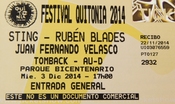
Sting offered a sober concert, in which he managed to balance his solo songs with those of The Police...
Those who wanted pop rock, with a touch of jazz, reggae, and even oriental music, went to Sting. Those who wanted to dance salsa and reflect on his very social lyrical content went to Rubén Blades. They have very different ideas, but one thing that defines them: social causes. In fact, this isn't the first time the former leader of the British trio The Police and the former Minister of Tourism of Panama have appeared at the same event. In the 1980s, they participated in charity campaigns.
Sting and Blades were the headliners of the Quitonía festival, which began at 5:00 p.m. with percussion by Tomback, rap by AU-D, and ballads and pasillo music featuring the voice of Juan Fernando Velasco, last Wednesday night in Bicentennial Park, in front of some 20,000 people.
Blades often tells the story of Adán García. He mentions Father Antonio and his altar boy Andrés. He names the Indian Camilo Manrique and Pablo Pueblo. He speaks of Agustín, Ernesto X, Mrs. Alta Gracia, Clara Quiñones, Juan Pachanga, and, of course, Pedro Navaja. On this occasion, Blades addressed these last two, but without neglecting songs like "Decisions" and "Love and Control," which deal with the consequences of making wrong choices and family.
The actor and lawyer, who is also a lawyer, didn't sing 'Por tu mala maña' (For Your Bad Manners), 'Chica plástico' (Plastic Girl), which has that very disco-like introduction of slaps on the bass strings, or 'Desapareciones' (Disappearances), about military dictatorships. However, the 'Poet of Conscious Salsa', who is increasingly less separated from his flat hat, has plenty of songs to rebuild his repertoire. This was confirmed with 'Guaguancó' (Guaguancó), 'Todos vuelve' (Everyone Returns), 'Caína' (Caine), a reference to cocaine, which he recorded in 1983 for the controversial album Buscando América (Searching America); 'Ojos de perro azul' (Blue Dog Eyes), inspired by Gabriel García Márquez's lyrics for the album Agua de luna (Moon Water); and his tribute to Héctor Lavoe with 'El cantante' (The Singer).
At nine o'clock at night, Sting's technical team was waiting at the sides of the stage. At that time, Blades finished his show, and in a matter of half an hour, the congas, timbales, and other instruments of his own were playing. The salsa drums were replaced by the Ludwig drums used by Vinnie Colaiuta, a regular on Sting's tours; a keyboard and a guitar, more speaker cabinets placed at the front of the stage, and a black curtain that changed colour with the robotic lights. It was a sober, simple, and welcoming setting.
Gordon Sumner, the real name of the 63-year-old British musician, appeared without much preamble playing "If I Ever Lose My Faith in You" on his Fender Telecaster bass, followed by "Every Little Thing She Does Is Magic," the first of The Police classics he played, which had a bossa nova-like ending.
Sporting a half-shaven beard and a tight gray T-shirt with tiny sleeves, Sting addressed the audience in forced Spanish (he was more like reading the messages written on the floor; his gaze was directed there).
At times, he swayed his hips, crossed his arms, drank water (at least five glasses), and joked with the crowd. with the collaboration of Argentine guitarist Dominic Miller, London keyboardist Jason Rebello, and Australian backing vocalist Jo Lawry.
Together they played "Fields of Gold," "All This Time," "Heavy Cloud No Rain," "Shape of My Heart," and "Desert Rose," with its Hindu base (a culture Sting is deeply passionate about) and a reggaeton-like drum ending to give it a Latin touch.
Although The Police classics like "De do do do de da da da" and "So Lonely" were missing, Sting made up for it with "Message in the Bottle," "Roxanne," and, of course, "Every Breath You Take," one of the most anticipated songs of the night, with which he threatened to leave, almost at eleven o'clock.
He returned to swap the bass for an acoustic guitar and play "Fragile," which closed his concert at eleven o'clock at night.
(c) El Telègrafo by Rafael Veintimilla Aragundi



